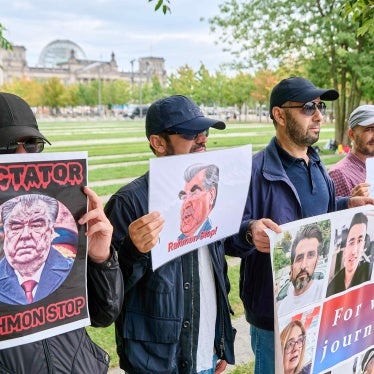Monsieur Manuel Valls
Premier minister
Hôtel Matignon
55 rue de Varenne
75007 Paris
Paris, May 18, 2015
Object : Open letter on the situation of M. Mukhtar Ablyazov (Kazakhstan)
Dear Prime Minister,
On behalf of Human Rights Watch, please accept my regards.
I am writing to express our concern about the pending extradition requests made by Ukraine and Russia for Mukhtar Ablyazov, a Kazakhstan national, and urge you to decline to approve his extradition.
As you may know, Human Rights Watch is an international, independent, nongovernmental organization that advocates respect for human rights worldwide. We report on the human rights situation in over 90 countries and have engaged in dialogue with the government of France on human rights issues for more than two decades.
In August 2013, the French authorities received requests from Kazakhstan, Russia, and Ukraine to extradite Mr. Ablyazov, a key political opposition figure in Kazakhstan. On October 24, 2014, the Lyon Court of Appeal ruled in favor of Mr. Ablyazov’s extradition to Ukraine or Russia, and on March 4, 2015, the Cassation Court rejected Mr. Ablyazov’s appeal of the extradition ruling.
Human Rights Watch is very concerned that if Mr. Ablyazov is extradited to either Russia or Ukraine, there is a real likelihood that he would then be forcibly returned to Kazakhstan where he would be at risk of persecution, including ill-treatment.
According to information provided by Mr. Ablyazov’s defense team, in the Lyon court proceedings, the prosecutor told the court that its ruling would be subjected to further analysis by the French government to determine the risks to Mr. Ablyazov, if extradited, and that it is ultimately the decision of the executive to issue an extradition order or not.
On behalf of Human Rights Watch, I ask that you uphold international human rights law in Mr. Ablyazov’s case and decline to approve his extradition either to Ukraine or Russia, given the credible threat of onward forced return to Kazakhstan from either of these countries.
As you are aware, Mr. Ablyazov maintains he has a well-founded fear of persecution, including ill-treatment, if he is returned to Kazakhstan. Under international and European human rights law, France has the absolute obligation not to return Mr. Ablyazov to Kazakhstan where he faces grave risk of ill-treatment and a flagrant denial of his fair trial and other due process rights. This obligation would be violated if Mr. Ablyazov was extradited to a country where there are substantial grounds to believe he is in danger of being handed over to Kazakhstan.
Human Rights Watch has every reason to believe that Mr. Ablyazov risks being returned to Kazakhstan if he is extradited to either Russia or Ukraine. We have documented the failure by Ukraine and Russia to live up to their international obligations not to return people to countries where they face a risk of ill-treatment or torture.
Human Rights Watch has documented multiple instances in recent years in which Russian authorities breached international human rights law by approving the extradition of asylum seekers to countries where they face the risk of torture and ill-treatment, such as Uzbekistan and Kyrgyzstan. We consider that Russia’s assurances that French authorities can visit Mr. Ablyazov during his detention do not provide sufficient protection to Mr. Ablyazov against onward return to Kazakhstan, and cannot be used as lawful grounds to allow his extradition.
In Ukraine, Human Rights Watch documented the case of Leonid Razvozzhaev, a Russian political activist who was charged with organizing mass riots during a May 2012 demonstration and who sought asylum in Ukraine. In October 2012, he was reported missing. He had last been seen outside the premises of a United Nations High Commissioner for Refugees’ (UNHCR) nongovernmental organization partner as he was in the process of seeking asylum. He reappeared in custody in Russia two days after he disappeared from Ukraine, strongly indicating that he was kidnapped and taken across the state border. Later, he said that Russian investigators had psychologically tortured him so that he would confess, including by threatening to harm him and his children. In July 2014, the Moscow City Court convicted him on mass riot charges and sentenced him to to 4.5 years in prison.
It is also important to note a July 2013 UNHCR report on Ukraine as a country of asylum, which found that Ukraine’s agreement with other former Soviet countries to cooperate in extradition of suspected criminals “can conflict with obligations under the 1951 [Refugee] Convention.” UNHCR noted that “in 2012, Ukraine extradited a refugee who had been recognized both under the UNHCR mandate and by another state-party to the 1951 Convention.” In a 2006 case, UNHCR stated that it was “appalled” that Ukraine forcibly returned 11 Uzbek asylum seekers to Uzbekistan where they faced a grave risk of torture and ill-treatment.
Mr. Prime Minister, France has the obligation to respect its international human rights commitments not to proceed with the extradition of a person who could be returned to the territory of a state where he faces real risk of grave human rights violations.
In this case, Mr. Ablyazov is at real risk of onward return to Kazakhstan if France takes the decision to extradite him to Russia or Ukraine. We therefore call on you to uphold France’s obligation to protect Mr. Ablyazov by declining to allow his extradition to proceed.
Thank you, Mr. Prime Minister, for your attention to these serious concerns.
Sincerely,
Jean-Marie Fardeau
France Director
Copy to:
M. Laurent Fabius, Minister of Foreign affairs and International development
Mme Christiane Taubira, Minister of Justice







